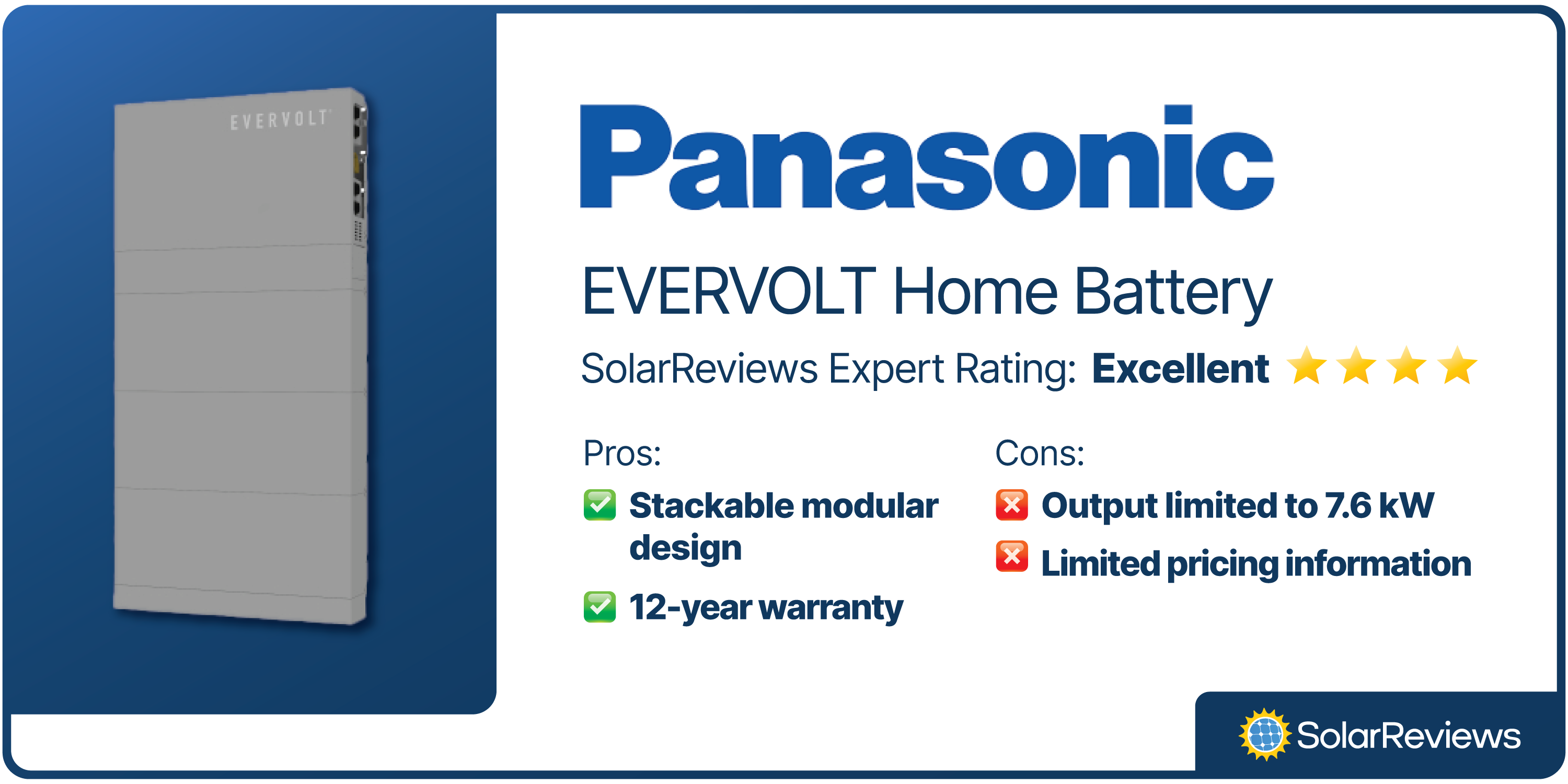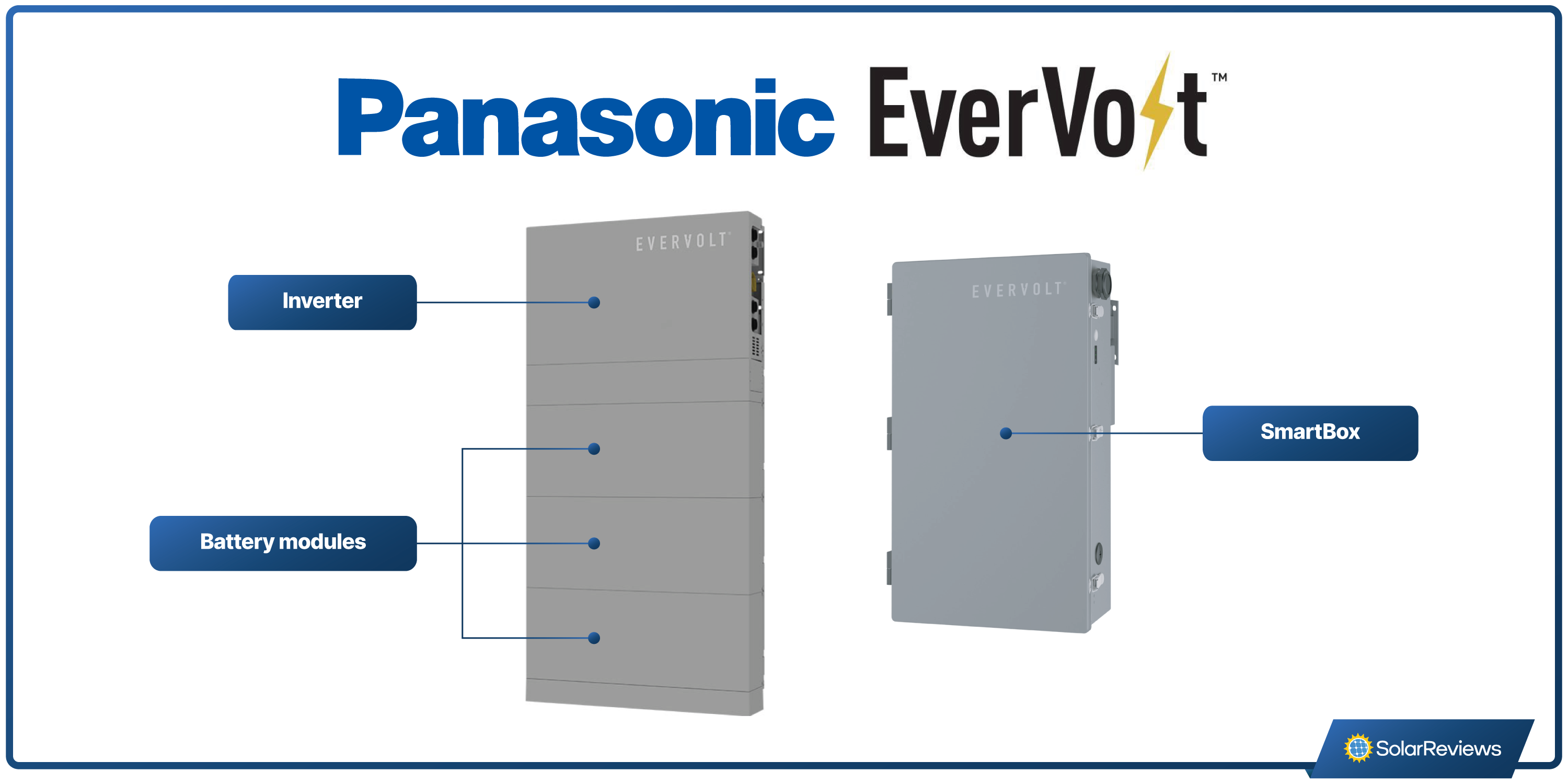Updated 4 weeks ago
Expert review of Panasonic’s EVERVOLT Home Battery
Written by Catherine Lane Catherine LaneCatherine has been researching and reporting on the solar industry for five years and is the Written Content Manager at SolarReviews. She leads a dyna...Learn more , Edited by Gianna Cappuccio Gianna CappuccioGianna Cappuccio is an editor at SolarReviews. After obtaining a Bachelor's in English from Montclair State University in 2016, Gianna decided to purs...Learn more


Why you can trust SolarReviews
SolarReviews is the leading American website for solar panel reviews and solar panel installation companies. Our industry experts have a combined three decades of solar experience and maintain editorial independence for their reviews. No company can pay to alter the reviews or review scores shown on our site. Learn more about SolarReviews and how we make money.
SolarReviews’ industry experts rated the Panasonic EVERVOLT Home Battery as the third-best solar battery of 2024. Its modular design allows for flexibility, and it comes with a fantastic warranty backed by one of the world’s largest electronics companies.
Expert review: Pansonic EVERVOLT Home Battery

We recommend the Panasonic EVERVOLT Home Battery to any homeowner looking for battery storage. In fact, it scored the number two spot on our list of best solar batteries of 2025.
The modular and stackable design of the EVERVOLT battery makes it easy to design a system with just the right amount of storage. It also has a stellar 12-year warranty, which is two years longer than the industry average. Plus, that warranty is backed by a reliable company. If something does go wrong, you can trust that Panasonic will be around to honor the claim.
How does the Panasonic EVERVOLT Home Battery work?

The Panasonic EVERVOLT Home Battery is designed to charge from solar panels, the grid, or a generator to power your home in the event of a power outage or when electricity rates are expensive and maximize the amount of solar electricity you use.
What sets the EVERVOLT apart is its modular and stackable design. Adding more battery packs or installing multiple units can easily increase storage capacity and power output.
There are three main pieces of equipment in a Panasonic battery system:
The battery modules which store energy. You can have up to four battery modules per inverter.
The inverter which converts electricity from the grid and your solar panels into energy that can be stored by the battery and used by the home
The EVERVOLT SmartBox battery management system, where the battery, grid, solar, and your home electrical loads connect.
These components work together to seamlessly integrate battery storage into your home, especially when installed with Panasonic EVERVOLT solar panels.
How does the Panasonic EVERVOLT Home Battery compare to other solar batteries?
Battery | Panasonic EVERVOLT Home Battery (EV-X15) | Tesla Powerwall 3 | Enphase IQ 10T |
|---|---|---|---|
Usable capacity | 13.5 kWh | 13.5 kWh | 10.08 kWh |
Continuous power output | 7.6 kW | 11.5 kW | 3.84 |
Round-trip efficiency (AC/DC coupling) | 90%/94% | 90% | 89%/96% |
Chemistry | LFP | LFP | LFP |
Warranty | 70% capacity at 12-years or 6,000 cycles | 70% capacity at 10 years, unlimited cycles (depending on operation) | 60% capacity at 15 years or 6,000 cycles |
Battery capacity
The usable capacity rating of a battery measures how much energy is stored and can be used from the battery.
The EVERVOLT Home battery has usable capacity ratings ranging from 9 kilowatt-hours (kWh) to 18 kWh, which is standard for most solar batteries. The best one for you depends on your energy needs, but most homeowners will likely be satisfied with either the 9 kWh or the 13.5 kWh size.
Since the EVERVOLT battery is modular, homeowners can choose how many battery packs they want. With each battery pack storing about 4.5 kWh, you get more flexibility over how much storage you install.
The Tesla Powerwall, on the other hand, requires you to install another 13.5 kWh battery expansion unit if you need more storage. The modular design of the EVERVOLT battery gives you more control over your system design so you don’t have to overpay for storage capacity you don’t need.
Continuous power output
A battery’s power output indicates how much power it can release, providing an idea of how many appliances it can power. The power output of the EVERVOLT battery will vary depending on how many battery modules you choose. The smallest EVERVOLT can output 5.5 kilowatts (kW), while the remaining models can release 7.6 kW.
Compared to popular home batteries like the Enphase IQ, the EVERVOLT battery is more powerful, but it’s still within ithe industry standard. You’ll have to install a second EVERVOLT unit if you need more power.
Round-trip efficiency
The efficiency of a battery reflects its ability to store and release power effectively. Panasonic's EVERVOLT battery demonstrates solid efficiency, reaching 90% when AC-coupled and 94% when DC-coupled, aligning well with industry standards.
AC-coupled batteries are slightly less efficient than their DC-coupled counterparts. This is because, in AC-coupled systems, the power generated by solar panels undergoes an additional conversion, resulting in more energy loss.
Choosing between AC and DC-coupled batteries depends on your solar panel setup. AC-coupled batteries are best for integration with existing solar panel systems, while DC-coupled batteries are preferable for simultaneous installation with the panels. Panasonic offers AC and DC-coupled models, so you’re set either way!
Chemistry
Almost all home solar batteries today are lithium-ion batteries. But, there are different types of lithium batteries available.
Panasonic uses lithium ferrite phosphate batteries, a chemistry that has quickly become the number one option among home storage manufacturers because it’s safer and longer lasting than alternatives.
Our experts tend to lean more towards LFP batteries than those that use nickel manganese cobalt (NMC) chemistry. However, that shouldn’t be a make-it-or-break-it decision.
Warranty
As batteries are used, they lose their ability to hold a charge. Think about your cell phone - you probably need to charge it more often now than when you first got it!
Home batteries work the same way. Luckily, batteries come with a performance warranty outlining how much capacity they will retain after a certain number of years or discharge cycles.
Panasonic’s warranty states the battery will retain 70% of its original capacity after 12 years or 6,000 cycles, whichever comes first. This is a fantastic warranty, as most manufacturers only offer 10 years of coverage or 5,000 cycles.
How much does the Panasonic EVERVOLT Home battery cost?
Panasonic doesn’t offer official pricing for its current battery, but historically, Panasonic has priced its battery products in line with other home batteries, maybe a touch on the higher side.
The average cost for a solar battery can be between $12,000 and $20,000, depending on the size and the installation. For reference, the Tesla Powerwall costs about $15,500 when installed by Tesla.
That’s a pretty hefty investment, but the Panasonic EVERVOLT Home Battery qualifies for the 30% federal tax credit, so you can earn a lot of savings. Additional battery incentives may also be available where you live to reduce battery costs even further!
Finding the right solar companies to install Panasonic batteries
Choosing the right solar installer is the most important decision you’ll make when looking to install solar panels or battery storage.
Solar-plus-storage systems are a long-term investment, so you need to choose a company that you can trust will be there to support you down the road. Our solar industry experts recommend finding companies that have been in business for at least five years, employ their own installation crew, and have consistent, high customer reviews.
To get the best price and the best quality possible, we recommend comparing at least three quotes from local solar companies.
Catherine has been researching and reporting on the solar industry for five years and is the Written Content Manager at SolarReviews. She leads a dynamic team in producing informative and engaging content on residential solar to help homeowners make informed decisions about investing in solar panels. Catherine’s expertise has garnered attention from leading industry publications, with her work being featured in Solar Today Magazine and Solar ...
Learn more about Catherine Lane